Organizational Behaviour: Influence of Culture, Power, and Politics on Performance
VerifiedAdded on 2023/01/05
|12
|3612
|67
AI Summary
This document explores the influence of organizational culture, power, and politics on individual and team performance. It discusses different types of organizational culture, such as power culture, role culture, task culture, and person culture. It also examines the French and Raven Model of power and the impact of political behavior on managers. Additionally, it explores the difference between effective and ineffective teams and the stages of team development. Finally, it covers key concepts and philosophies of organizational behaviour, including individual differences, perception, and motivation.
Contribute Materials
Your contribution can guide someone’s learning journey. Share your
documents today.
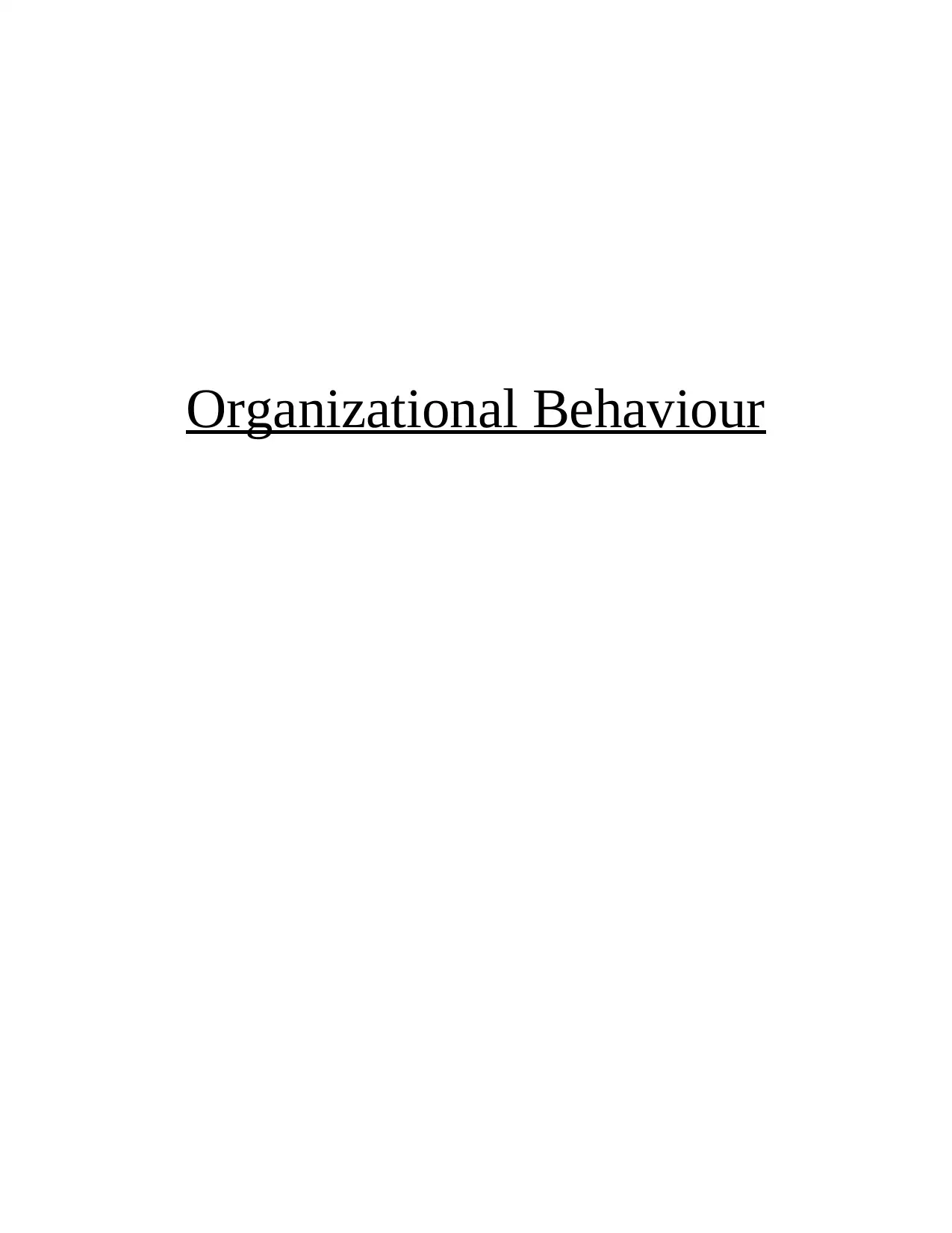
Organizational Behaviour
Secure Best Marks with AI Grader
Need help grading? Try our AI Grader for instant feedback on your assignments.
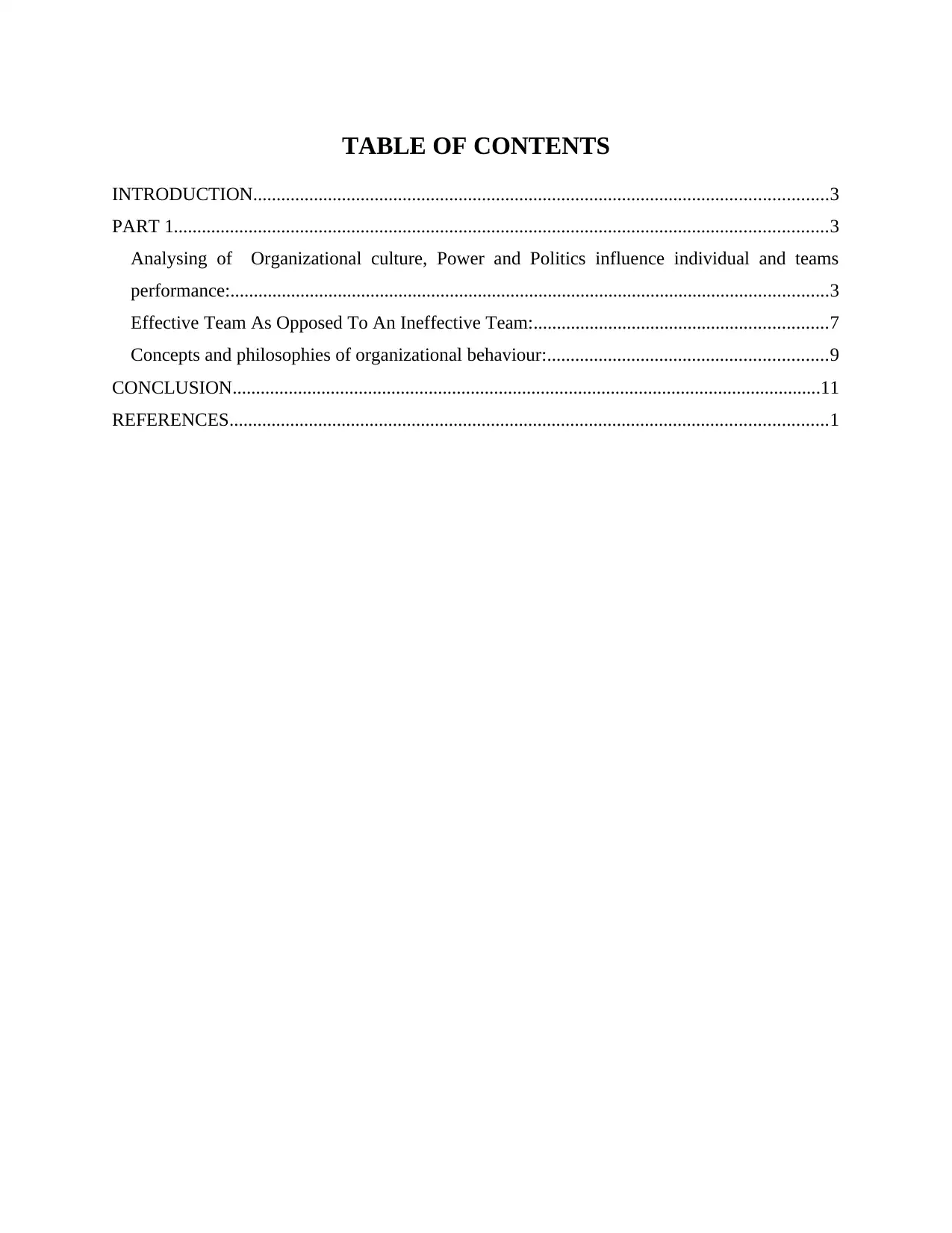
TABLE OF CONTENTS
INTRODUCTION...........................................................................................................................3
PART 1............................................................................................................................................3
Analysing of Organizational culture, Power and Politics influence individual and teams
performance:................................................................................................................................3
Effective Team As Opposed To An Ineffective Team:...............................................................7
Concepts and philosophies of organizational behaviour:............................................................9
CONCLUSION..............................................................................................................................11
REFERENCES................................................................................................................................1
INTRODUCTION...........................................................................................................................3
PART 1............................................................................................................................................3
Analysing of Organizational culture, Power and Politics influence individual and teams
performance:................................................................................................................................3
Effective Team As Opposed To An Ineffective Team:...............................................................7
Concepts and philosophies of organizational behaviour:............................................................9
CONCLUSION..............................................................................................................................11
REFERENCES................................................................................................................................1
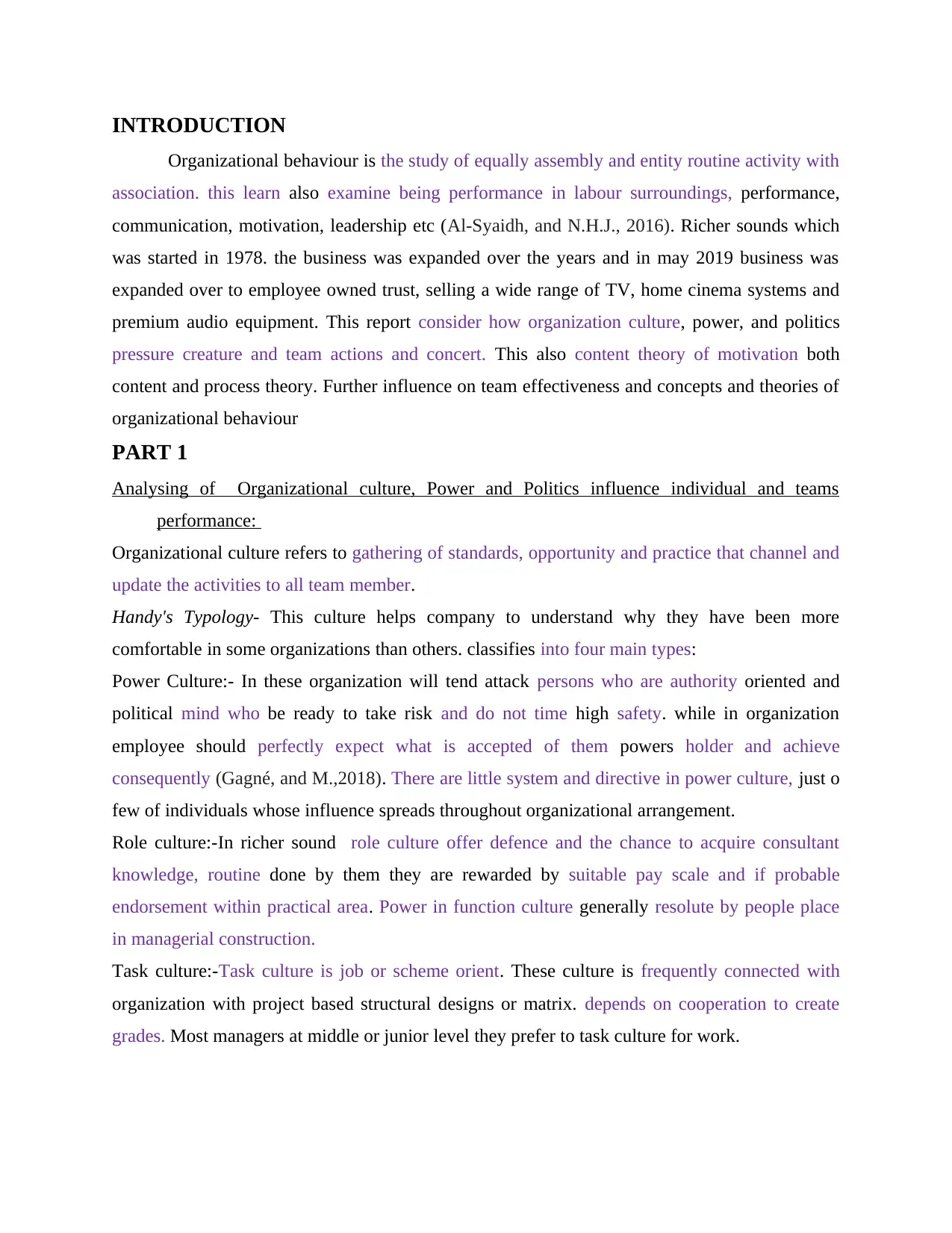
INTRODUCTION
Organizational behaviour is the study of equally assembly and entity routine activity with
association. this learn also examine being performance in labour surroundings, performance,
communication, motivation, leadership etc (Al-Syaidh, and N.H.J., 2016). Richer sounds which
was started in 1978. the business was expanded over the years and in may 2019 business was
expanded over to employee owned trust, selling a wide range of TV, home cinema systems and
premium audio equipment. This report consider how organization culture, power, and politics
pressure creature and team actions and concert. This also content theory of motivation both
content and process theory. Further influence on team effectiveness and concepts and theories of
organizational behaviour
PART 1
Analysing of Organizational culture, Power and Politics influence individual and teams
performance:
Organizational culture refers to gathering of standards, opportunity and practice that channel and
update the activities to all team member.
Handy's Typology- This culture helps company to understand why they have been more
comfortable in some organizations than others. classifies into four main types:
Power Culture:- In these organization will tend attack persons who are authority oriented and
political mind who be ready to take risk and do not time high safety. while in organization
employee should perfectly expect what is accepted of them powers holder and achieve
consequently (Gagné, and M.,2018). There are little system and directive in power culture, just o
few of individuals whose influence spreads throughout organizational arrangement.
Role culture:-In richer sound role culture offer defence and the chance to acquire consultant
knowledge, routine done by them they are rewarded by suitable pay scale and if probable
endorsement within practical area. Power in function culture generally resolute by people place
in managerial construction.
Task culture:-Task culture is job or scheme orient. These culture is frequently connected with
organization with project based structural designs or matrix. depends on cooperation to create
grades. Most managers at middle or junior level they prefer to task culture for work.
Organizational behaviour is the study of equally assembly and entity routine activity with
association. this learn also examine being performance in labour surroundings, performance,
communication, motivation, leadership etc (Al-Syaidh, and N.H.J., 2016). Richer sounds which
was started in 1978. the business was expanded over the years and in may 2019 business was
expanded over to employee owned trust, selling a wide range of TV, home cinema systems and
premium audio equipment. This report consider how organization culture, power, and politics
pressure creature and team actions and concert. This also content theory of motivation both
content and process theory. Further influence on team effectiveness and concepts and theories of
organizational behaviour
PART 1
Analysing of Organizational culture, Power and Politics influence individual and teams
performance:
Organizational culture refers to gathering of standards, opportunity and practice that channel and
update the activities to all team member.
Handy's Typology- This culture helps company to understand why they have been more
comfortable in some organizations than others. classifies into four main types:
Power Culture:- In these organization will tend attack persons who are authority oriented and
political mind who be ready to take risk and do not time high safety. while in organization
employee should perfectly expect what is accepted of them powers holder and achieve
consequently (Gagné, and M.,2018). There are little system and directive in power culture, just o
few of individuals whose influence spreads throughout organizational arrangement.
Role culture:-In richer sound role culture offer defence and the chance to acquire consultant
knowledge, routine done by them they are rewarded by suitable pay scale and if probable
endorsement within practical area. Power in function culture generally resolute by people place
in managerial construction.
Task culture:-Task culture is job or scheme orient. These culture is frequently connected with
organization with project based structural designs or matrix. depends on cooperation to create
grades. Most managers at middle or junior level they prefer to task culture for work.
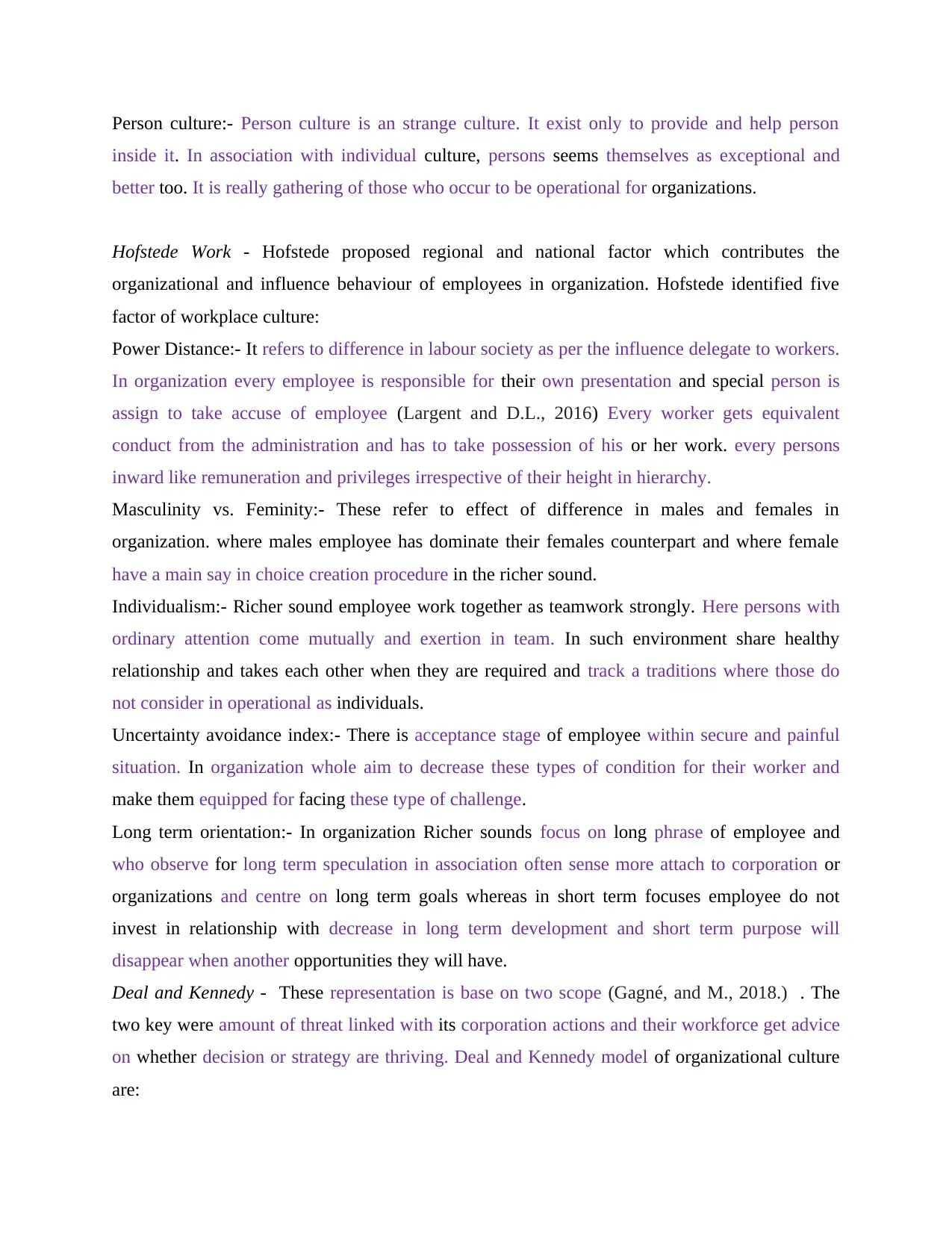
Person culture:- Person culture is an strange culture. It exist only to provide and help person
inside it. In association with individual culture, persons seems themselves as exceptional and
better too. It is really gathering of those who occur to be operational for organizations.
Hofstede Work - Hofstede proposed regional and national factor which contributes the
organizational and influence behaviour of employees in organization. Hofstede identified five
factor of workplace culture:
Power Distance:- It refers to difference in labour society as per the influence delegate to workers.
In organization every employee is responsible for their own presentation and special person is
assign to take accuse of employee (Largent and D.L., 2016) Every worker gets equivalent
conduct from the administration and has to take possession of his or her work. every persons
inward like remuneration and privileges irrespective of their height in hierarchy.
Masculinity vs. Feminity:- These refer to effect of difference in males and females in
organization. where males employee has dominate their females counterpart and where female
have a main say in choice creation procedure in the richer sound.
Individualism:- Richer sound employee work together as teamwork strongly. Here persons with
ordinary attention come mutually and exertion in team. In such environment share healthy
relationship and takes each other when they are required and track a traditions where those do
not consider in operational as individuals.
Uncertainty avoidance index:- There is acceptance stage of employee within secure and painful
situation. In organization whole aim to decrease these types of condition for their worker and
make them equipped for facing these type of challenge.
Long term orientation:- In organization Richer sounds focus on long phrase of employee and
who observe for long term speculation in association often sense more attach to corporation or
organizations and centre on long term goals whereas in short term focuses employee do not
invest in relationship with decrease in long term development and short term purpose will
disappear when another opportunities they will have.
Deal and Kennedy - These representation is base on two scope (Gagné, and M., 2018.) . The
two key were amount of threat linked with its corporation actions and their workforce get advice
on whether decision or strategy are thriving. Deal and Kennedy model of organizational culture
are:
inside it. In association with individual culture, persons seems themselves as exceptional and
better too. It is really gathering of those who occur to be operational for organizations.
Hofstede Work - Hofstede proposed regional and national factor which contributes the
organizational and influence behaviour of employees in organization. Hofstede identified five
factor of workplace culture:
Power Distance:- It refers to difference in labour society as per the influence delegate to workers.
In organization every employee is responsible for their own presentation and special person is
assign to take accuse of employee (Largent and D.L., 2016) Every worker gets equivalent
conduct from the administration and has to take possession of his or her work. every persons
inward like remuneration and privileges irrespective of their height in hierarchy.
Masculinity vs. Feminity:- These refer to effect of difference in males and females in
organization. where males employee has dominate their females counterpart and where female
have a main say in choice creation procedure in the richer sound.
Individualism:- Richer sound employee work together as teamwork strongly. Here persons with
ordinary attention come mutually and exertion in team. In such environment share healthy
relationship and takes each other when they are required and track a traditions where those do
not consider in operational as individuals.
Uncertainty avoidance index:- There is acceptance stage of employee within secure and painful
situation. In organization whole aim to decrease these types of condition for their worker and
make them equipped for facing these type of challenge.
Long term orientation:- In organization Richer sounds focus on long phrase of employee and
who observe for long term speculation in association often sense more attach to corporation or
organizations and centre on long term goals whereas in short term focuses employee do not
invest in relationship with decrease in long term development and short term purpose will
disappear when another opportunities they will have.
Deal and Kennedy - These representation is base on two scope (Gagné, and M., 2018.) . The
two key were amount of threat linked with its corporation actions and their workforce get advice
on whether decision or strategy are thriving. Deal and Kennedy model of organizational culture
are:
Secure Best Marks with AI Grader
Need help grading? Try our AI Grader for instant feedback on your assignments.
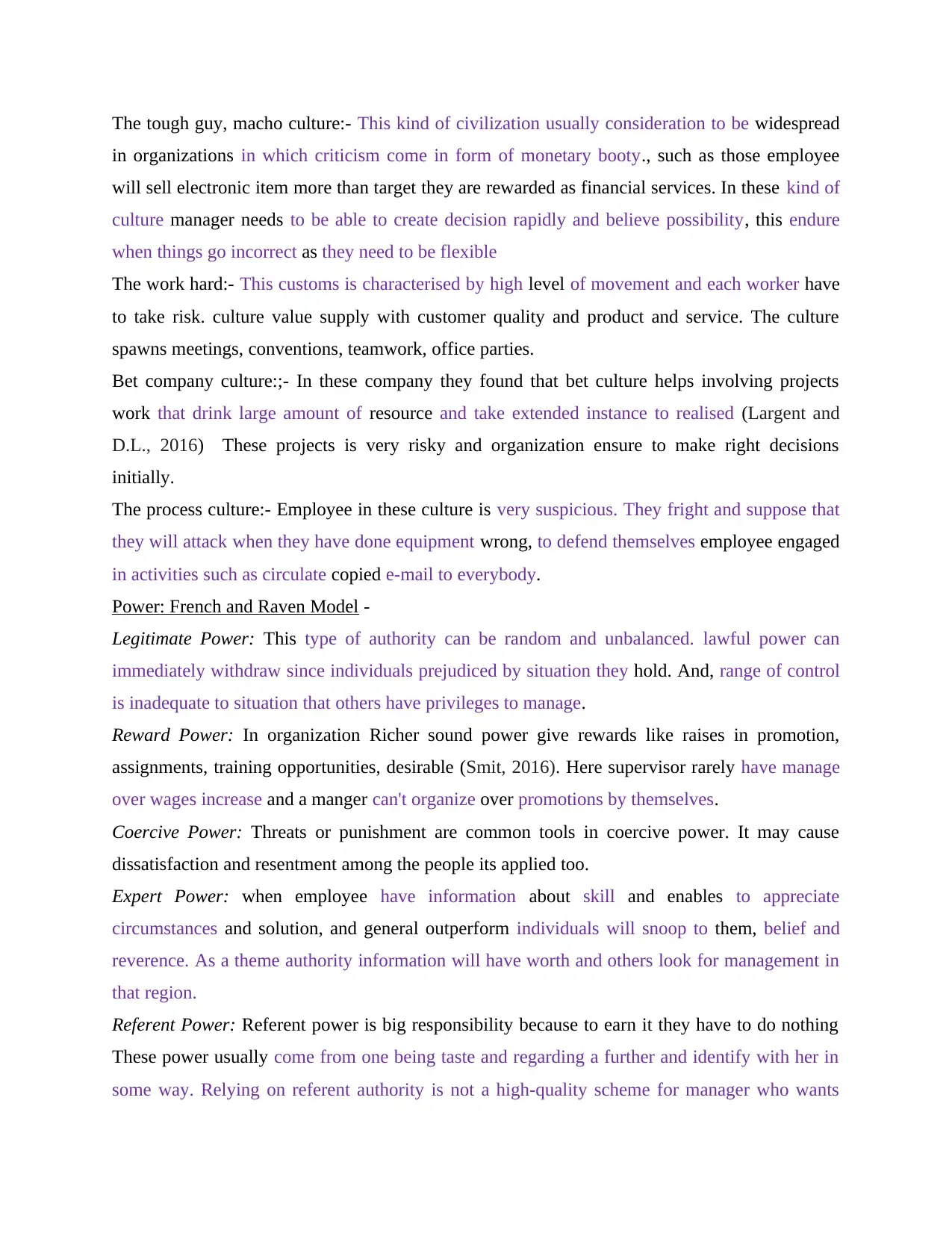
The tough guy, macho culture:- This kind of civilization usually consideration to be widespread
in organizations in which criticism come in form of monetary booty., such as those employee
will sell electronic item more than target they are rewarded as financial services. In these kind of
culture manager needs to be able to create decision rapidly and believe possibility, this endure
when things go incorrect as they need to be flexible
The work hard:- This customs is characterised by high level of movement and each worker have
to take risk. culture value supply with customer quality and product and service. The culture
spawns meetings, conventions, teamwork, office parties.
Bet company culture:;- In these company they found that bet culture helps involving projects
work that drink large amount of resource and take extended instance to realised (Largent and
D.L., 2016) These projects is very risky and organization ensure to make right decisions
initially.
The process culture:- Employee in these culture is very suspicious. They fright and suppose that
they will attack when they have done equipment wrong, to defend themselves employee engaged
in activities such as circulate copied e-mail to everybody.
Power: French and Raven Model -
Legitimate Power: This type of authority can be random and unbalanced. lawful power can
immediately withdraw since individuals prejudiced by situation they hold. And, range of control
is inadequate to situation that others have privileges to manage.
Reward Power: In organization Richer sound power give rewards like raises in promotion,
assignments, training opportunities, desirable (Smit, 2016). Here supervisor rarely have manage
over wages increase and a manger can't organize over promotions by themselves.
Coercive Power: Threats or punishment are common tools in coercive power. It may cause
dissatisfaction and resentment among the people its applied too.
Expert Power: when employee have information about skill and enables to appreciate
circumstances and solution, and general outperform individuals will snoop to them, belief and
reverence. As a theme authority information will have worth and others look for management in
that region.
Referent Power: Referent power is big responsibility because to earn it they have to do nothing
These power usually come from one being taste and regarding a further and identify with her in
some way. Relying on referent authority is not a high-quality scheme for manager who wants
in organizations in which criticism come in form of monetary booty., such as those employee
will sell electronic item more than target they are rewarded as financial services. In these kind of
culture manager needs to be able to create decision rapidly and believe possibility, this endure
when things go incorrect as they need to be flexible
The work hard:- This customs is characterised by high level of movement and each worker have
to take risk. culture value supply with customer quality and product and service. The culture
spawns meetings, conventions, teamwork, office parties.
Bet company culture:;- In these company they found that bet culture helps involving projects
work that drink large amount of resource and take extended instance to realised (Largent and
D.L., 2016) These projects is very risky and organization ensure to make right decisions
initially.
The process culture:- Employee in these culture is very suspicious. They fright and suppose that
they will attack when they have done equipment wrong, to defend themselves employee engaged
in activities such as circulate copied e-mail to everybody.
Power: French and Raven Model -
Legitimate Power: This type of authority can be random and unbalanced. lawful power can
immediately withdraw since individuals prejudiced by situation they hold. And, range of control
is inadequate to situation that others have privileges to manage.
Reward Power: In organization Richer sound power give rewards like raises in promotion,
assignments, training opportunities, desirable (Smit, 2016). Here supervisor rarely have manage
over wages increase and a manger can't organize over promotions by themselves.
Coercive Power: Threats or punishment are common tools in coercive power. It may cause
dissatisfaction and resentment among the people its applied too.
Expert Power: when employee have information about skill and enables to appreciate
circumstances and solution, and general outperform individuals will snoop to them, belief and
reverence. As a theme authority information will have worth and others look for management in
that region.
Referent Power: Referent power is big responsibility because to earn it they have to do nothing
These power usually come from one being taste and regarding a further and identify with her in
some way. Relying on referent authority is not a high-quality scheme for manager who wants
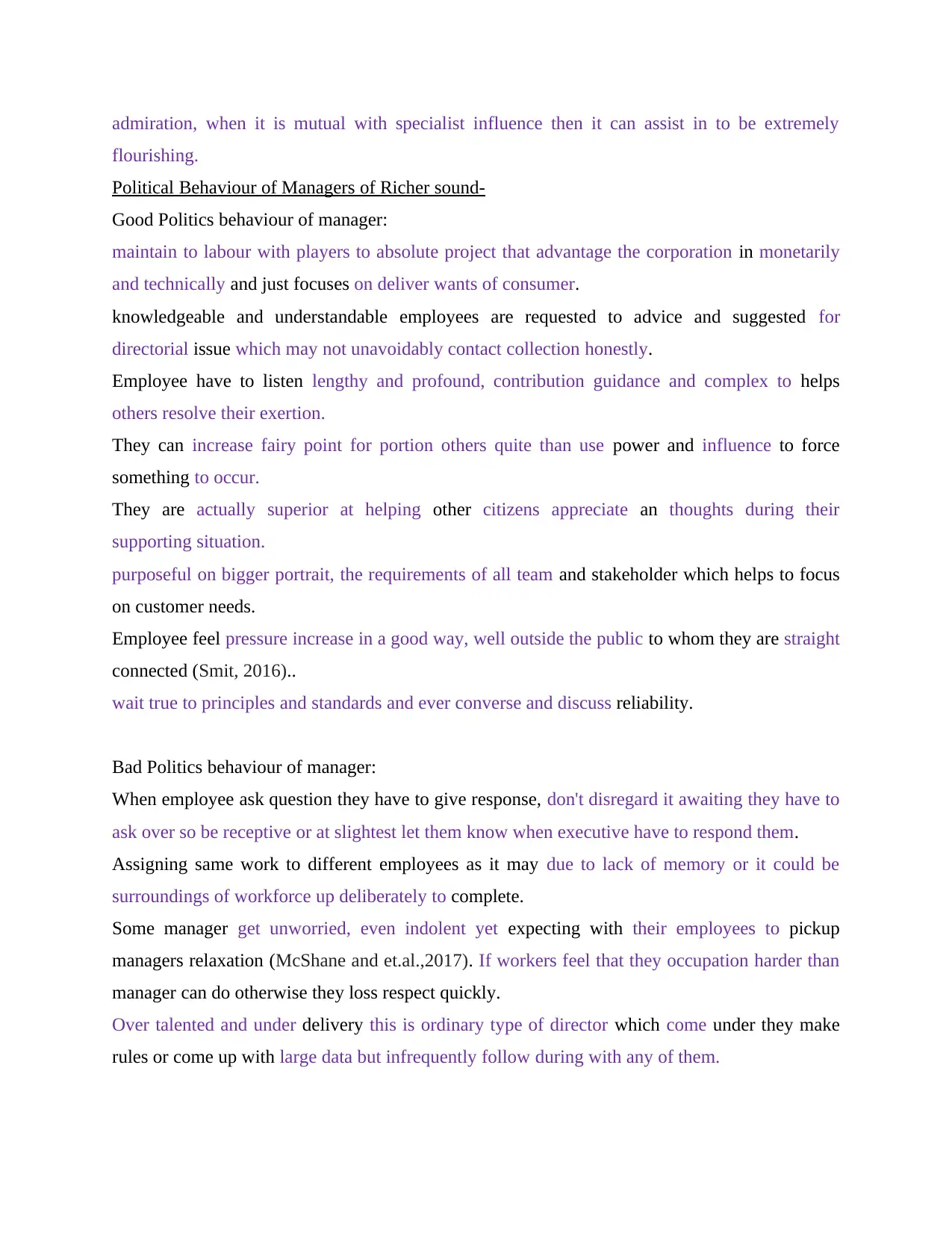
admiration, when it is mutual with specialist influence then it can assist in to be extremely
flourishing.
Political Behaviour of Managers of Richer sound-
Good Politics behaviour of manager:
maintain to labour with players to absolute project that advantage the corporation in monetarily
and technically and just focuses on deliver wants of consumer.
knowledgeable and understandable employees are requested to advice and suggested for
directorial issue which may not unavoidably contact collection honestly.
Employee have to listen lengthy and profound, contribution guidance and complex to helps
others resolve their exertion.
They can increase fairy point for portion others quite than use power and influence to force
something to occur.
They are actually superior at helping other citizens appreciate an thoughts during their
supporting situation.
purposeful on bigger portrait, the requirements of all team and stakeholder which helps to focus
on customer needs.
Employee feel pressure increase in a good way, well outside the public to whom they are straight
connected (Smit, 2016)..
wait true to principles and standards and ever converse and discuss reliability.
Bad Politics behaviour of manager:
When employee ask question they have to give response, don't disregard it awaiting they have to
ask over so be receptive or at slightest let them know when executive have to respond them.
Assigning same work to different employees as it may due to lack of memory or it could be
surroundings of workforce up deliberately to complete.
Some manager get unworried, even indolent yet expecting with their employees to pickup
managers relaxation (McShane and et.al.,2017). If workers feel that they occupation harder than
manager can do otherwise they loss respect quickly.
Over talented and under delivery this is ordinary type of director which come under they make
rules or come up with large data but infrequently follow during with any of them.
flourishing.
Political Behaviour of Managers of Richer sound-
Good Politics behaviour of manager:
maintain to labour with players to absolute project that advantage the corporation in monetarily
and technically and just focuses on deliver wants of consumer.
knowledgeable and understandable employees are requested to advice and suggested for
directorial issue which may not unavoidably contact collection honestly.
Employee have to listen lengthy and profound, contribution guidance and complex to helps
others resolve their exertion.
They can increase fairy point for portion others quite than use power and influence to force
something to occur.
They are actually superior at helping other citizens appreciate an thoughts during their
supporting situation.
purposeful on bigger portrait, the requirements of all team and stakeholder which helps to focus
on customer needs.
Employee feel pressure increase in a good way, well outside the public to whom they are straight
connected (Smit, 2016)..
wait true to principles and standards and ever converse and discuss reliability.
Bad Politics behaviour of manager:
When employee ask question they have to give response, don't disregard it awaiting they have to
ask over so be receptive or at slightest let them know when executive have to respond them.
Assigning same work to different employees as it may due to lack of memory or it could be
surroundings of workforce up deliberately to complete.
Some manager get unworried, even indolent yet expecting with their employees to pickup
managers relaxation (McShane and et.al.,2017). If workers feel that they occupation harder than
manager can do otherwise they loss respect quickly.
Over talented and under delivery this is ordinary type of director which come under they make
rules or come up with large data but infrequently follow during with any of them.
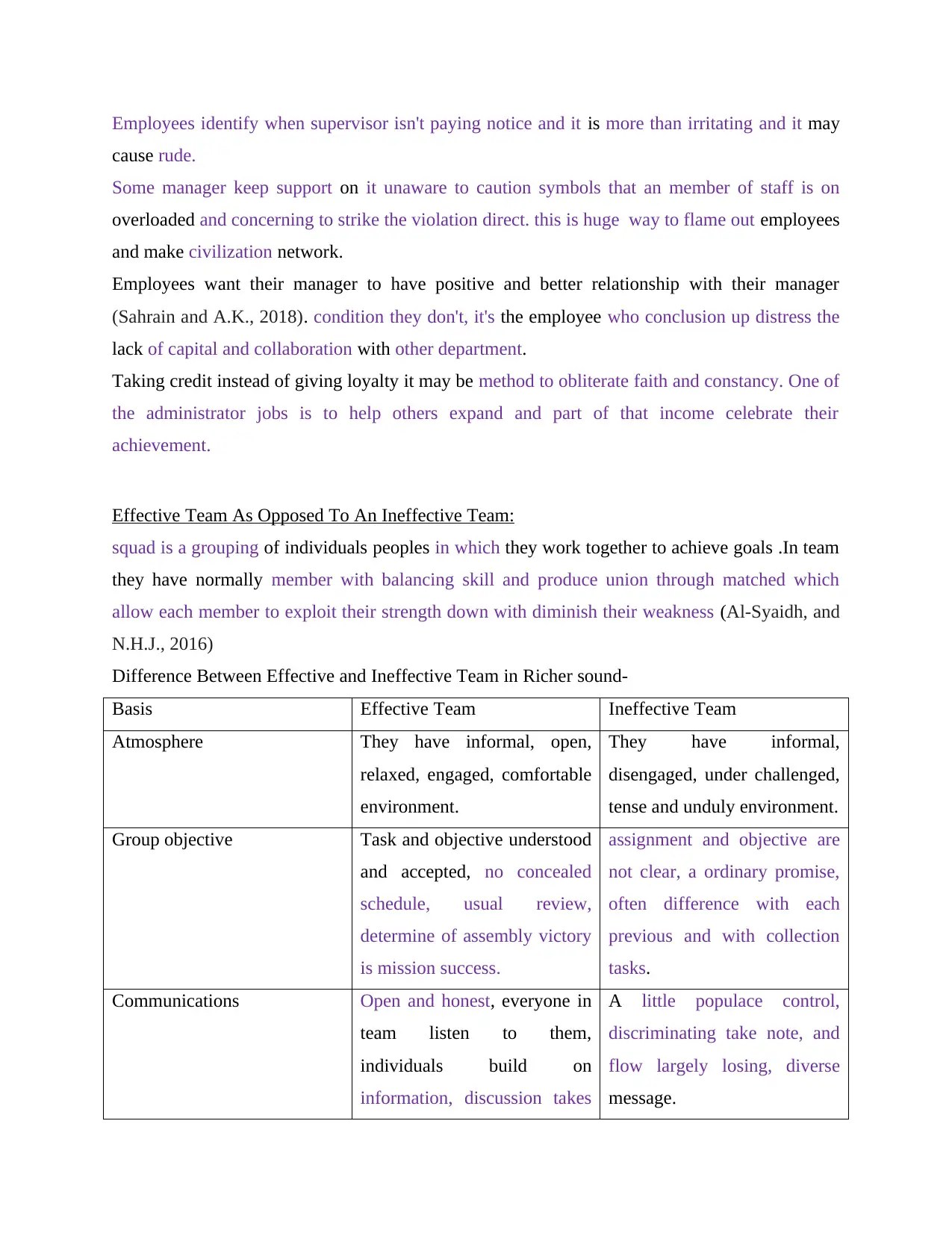
Employees identify when supervisor isn't paying notice and it is more than irritating and it may
cause rude.
Some manager keep support on it unaware to caution symbols that an member of staff is on
overloaded and concerning to strike the violation direct. this is huge way to flame out employees
and make civilization network.
Employees want their manager to have positive and better relationship with their manager
(Sahrain and A.K., 2018). condition they don't, it's the employee who conclusion up distress the
lack of capital and collaboration with other department.
Taking credit instead of giving loyalty it may be method to obliterate faith and constancy. One of
the administrator jobs is to help others expand and part of that income celebrate their
achievement.
Effective Team As Opposed To An Ineffective Team:
squad is a grouping of individuals peoples in which they work together to achieve goals .In team
they have normally member with balancing skill and produce union through matched which
allow each member to exploit their strength down with diminish their weakness (Al-Syaidh, and
N.H.J., 2016)
Difference Between Effective and Ineffective Team in Richer sound-
Basis Effective Team Ineffective Team
Atmosphere They have informal, open,
relaxed, engaged, comfortable
environment.
They have informal,
disengaged, under challenged,
tense and unduly environment.
Group objective Task and objective understood
and accepted, no concealed
schedule, usual review,
determine of assembly victory
is mission success.
assignment and objective are
not clear, a ordinary promise,
often difference with each
previous and with collection
tasks.
Communications Open and honest, everyone in
team listen to them,
individuals build on
information, discussion takes
A little populace control,
discriminating take note, and
flow largely losing, diverse
message.
cause rude.
Some manager keep support on it unaware to caution symbols that an member of staff is on
overloaded and concerning to strike the violation direct. this is huge way to flame out employees
and make civilization network.
Employees want their manager to have positive and better relationship with their manager
(Sahrain and A.K., 2018). condition they don't, it's the employee who conclusion up distress the
lack of capital and collaboration with other department.
Taking credit instead of giving loyalty it may be method to obliterate faith and constancy. One of
the administrator jobs is to help others expand and part of that income celebrate their
achievement.
Effective Team As Opposed To An Ineffective Team:
squad is a grouping of individuals peoples in which they work together to achieve goals .In team
they have normally member with balancing skill and produce union through matched which
allow each member to exploit their strength down with diminish their weakness (Al-Syaidh, and
N.H.J., 2016)
Difference Between Effective and Ineffective Team in Richer sound-
Basis Effective Team Ineffective Team
Atmosphere They have informal, open,
relaxed, engaged, comfortable
environment.
They have informal,
disengaged, under challenged,
tense and unduly environment.
Group objective Task and objective understood
and accepted, no concealed
schedule, usual review,
determine of assembly victory
is mission success.
assignment and objective are
not clear, a ordinary promise,
often difference with each
previous and with collection
tasks.
Communications Open and honest, everyone in
team listen to them,
individuals build on
information, discussion takes
A little populace control,
discriminating take note, and
flow largely losing, diverse
message.
Paraphrase This Document
Need a fresh take? Get an instant paraphrase of this document with our AI Paraphraser
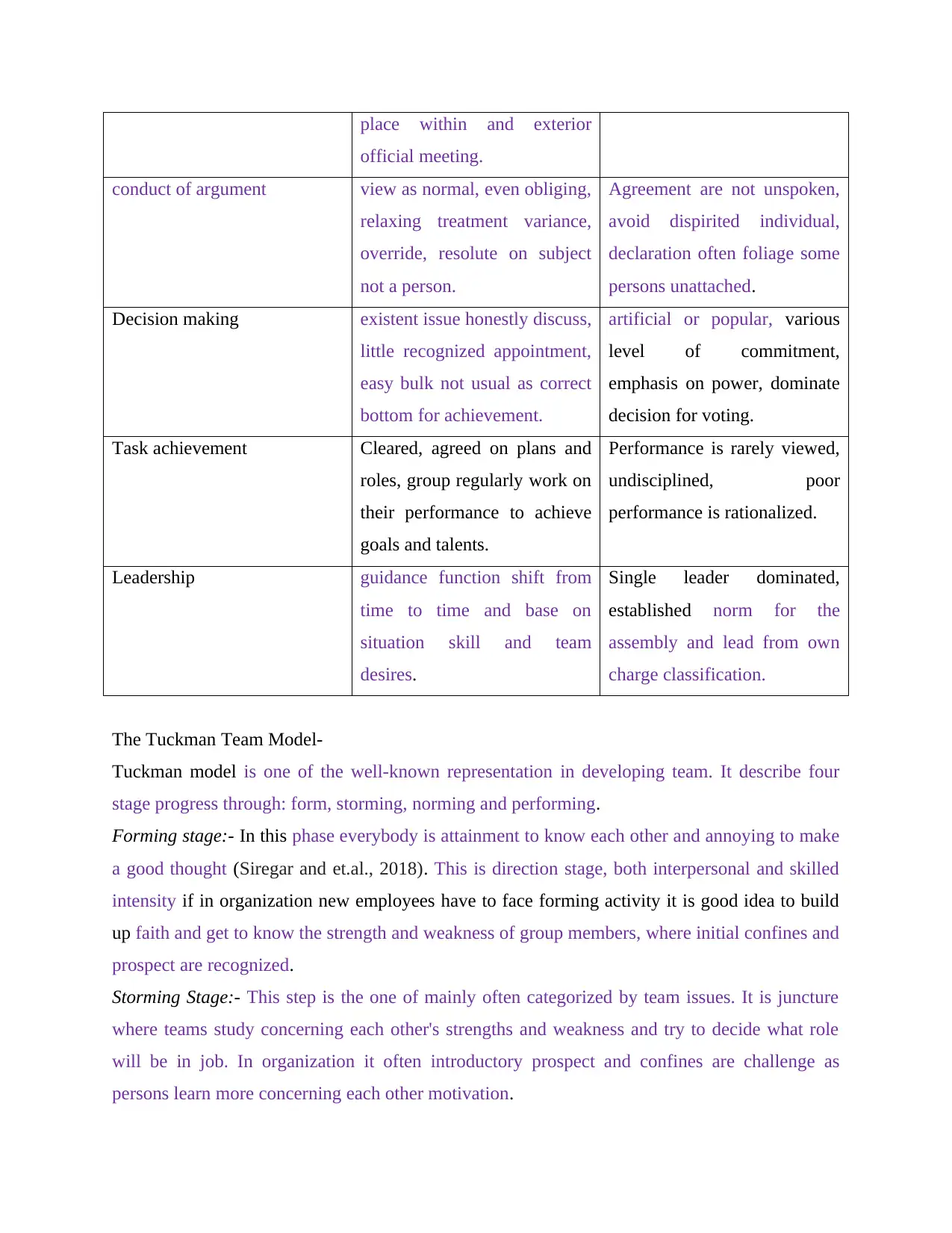
place within and exterior
official meeting.
conduct of argument view as normal, even obliging,
relaxing treatment variance,
override, resolute on subject
not a person.
Agreement are not unspoken,
avoid dispirited individual,
declaration often foliage some
persons unattached.
Decision making existent issue honestly discuss,
little recognized appointment,
easy bulk not usual as correct
bottom for achievement.
artificial or popular, various
level of commitment,
emphasis on power, dominate
decision for voting.
Task achievement Cleared, agreed on plans and
roles, group regularly work on
their performance to achieve
goals and talents.
Performance is rarely viewed,
undisciplined, poor
performance is rationalized.
Leadership guidance function shift from
time to time and base on
situation skill and team
desires.
Single leader dominated,
established norm for the
assembly and lead from own
charge classification.
The Tuckman Team Model-
Tuckman model is one of the well-known representation in developing team. It describe four
stage progress through: form, storming, norming and performing.
Forming stage:- In this phase everybody is attainment to know each other and annoying to make
a good thought (Siregar and et.al., 2018). This is direction stage, both interpersonal and skilled
intensity if in organization new employees have to face forming activity it is good idea to build
up faith and get to know the strength and weakness of group members, where initial confines and
prospect are recognized.
Storming Stage:- This step is the one of mainly often categorized by team issues. It is juncture
where teams study concerning each other's strengths and weakness and try to decide what role
will be in job. In organization it often introductory prospect and confines are challenge as
persons learn more concerning each other motivation.
official meeting.
conduct of argument view as normal, even obliging,
relaxing treatment variance,
override, resolute on subject
not a person.
Agreement are not unspoken,
avoid dispirited individual,
declaration often foliage some
persons unattached.
Decision making existent issue honestly discuss,
little recognized appointment,
easy bulk not usual as correct
bottom for achievement.
artificial or popular, various
level of commitment,
emphasis on power, dominate
decision for voting.
Task achievement Cleared, agreed on plans and
roles, group regularly work on
their performance to achieve
goals and talents.
Performance is rarely viewed,
undisciplined, poor
performance is rationalized.
Leadership guidance function shift from
time to time and base on
situation skill and team
desires.
Single leader dominated,
established norm for the
assembly and lead from own
charge classification.
The Tuckman Team Model-
Tuckman model is one of the well-known representation in developing team. It describe four
stage progress through: form, storming, norming and performing.
Forming stage:- In this phase everybody is attainment to know each other and annoying to make
a good thought (Siregar and et.al., 2018). This is direction stage, both interpersonal and skilled
intensity if in organization new employees have to face forming activity it is good idea to build
up faith and get to know the strength and weakness of group members, where initial confines and
prospect are recognized.
Storming Stage:- This step is the one of mainly often categorized by team issues. It is juncture
where teams study concerning each other's strengths and weakness and try to decide what role
will be in job. In organization it often introductory prospect and confines are challenge as
persons learn more concerning each other motivation.
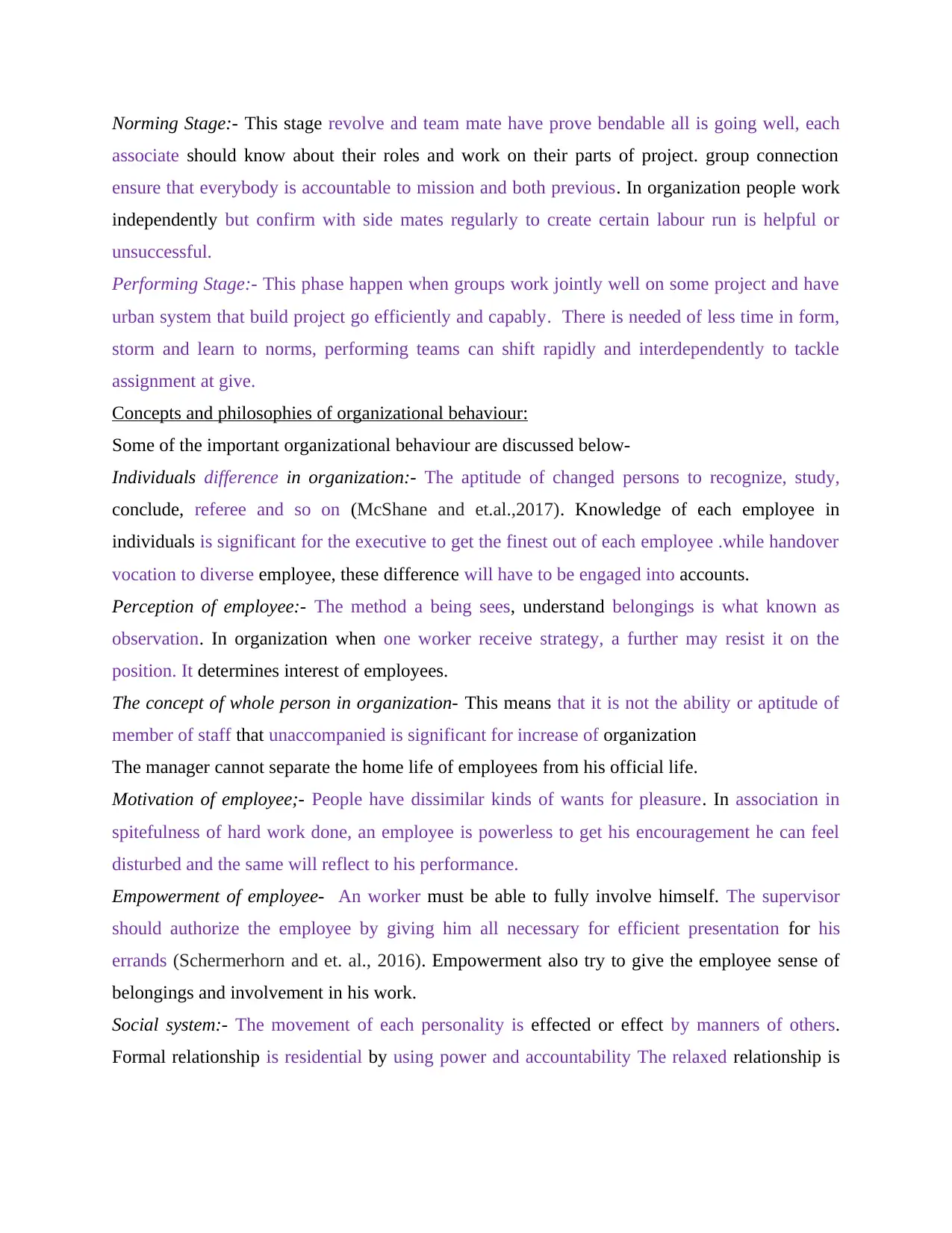
Norming Stage:- This stage revolve and team mate have prove bendable all is going well, each
associate should know about their roles and work on their parts of project. group connection
ensure that everybody is accountable to mission and both previous. In organization people work
independently but confirm with side mates regularly to create certain labour run is helpful or
unsuccessful.
Performing Stage:- This phase happen when groups work jointly well on some project and have
urban system that build project go efficiently and capably. There is needed of less time in form,
storm and learn to norms, performing teams can shift rapidly and interdependently to tackle
assignment at give.
Concepts and philosophies of organizational behaviour:
Some of the important organizational behaviour are discussed below-
Individuals difference in organization:- The aptitude of changed persons to recognize, study,
conclude, referee and so on (McShane and et.al.,2017). Knowledge of each employee in
individuals is significant for the executive to get the finest out of each employee .while handover
vocation to diverse employee, these difference will have to be engaged into accounts.
Perception of employee:- The method a being sees, understand belongings is what known as
observation. In organization when one worker receive strategy, a further may resist it on the
position. It determines interest of employees.
The concept of whole person in organization- This means that it is not the ability or aptitude of
member of staff that unaccompanied is significant for increase of organization
The manager cannot separate the home life of employees from his official life.
Motivation of employee;- People have dissimilar kinds of wants for pleasure. In association in
spitefulness of hard work done, an employee is powerless to get his encouragement he can feel
disturbed and the same will reflect to his performance.
Empowerment of employee- An worker must be able to fully involve himself. The supervisor
should authorize the employee by giving him all necessary for efficient presentation for his
errands (Schermerhorn and et. al., 2016). Empowerment also try to give the employee sense of
belongings and involvement in his work.
Social system:- The movement of each personality is effected or effect by manners of others.
Formal relationship is residential by using power and accountability The relaxed relationship is
associate should know about their roles and work on their parts of project. group connection
ensure that everybody is accountable to mission and both previous. In organization people work
independently but confirm with side mates regularly to create certain labour run is helpful or
unsuccessful.
Performing Stage:- This phase happen when groups work jointly well on some project and have
urban system that build project go efficiently and capably. There is needed of less time in form,
storm and learn to norms, performing teams can shift rapidly and interdependently to tackle
assignment at give.
Concepts and philosophies of organizational behaviour:
Some of the important organizational behaviour are discussed below-
Individuals difference in organization:- The aptitude of changed persons to recognize, study,
conclude, referee and so on (McShane and et.al.,2017). Knowledge of each employee in
individuals is significant for the executive to get the finest out of each employee .while handover
vocation to diverse employee, these difference will have to be engaged into accounts.
Perception of employee:- The method a being sees, understand belongings is what known as
observation. In organization when one worker receive strategy, a further may resist it on the
position. It determines interest of employees.
The concept of whole person in organization- This means that it is not the ability or aptitude of
member of staff that unaccompanied is significant for increase of organization
The manager cannot separate the home life of employees from his official life.
Motivation of employee;- People have dissimilar kinds of wants for pleasure. In association in
spitefulness of hard work done, an employee is powerless to get his encouragement he can feel
disturbed and the same will reflect to his performance.
Empowerment of employee- An worker must be able to fully involve himself. The supervisor
should authorize the employee by giving him all necessary for efficient presentation for his
errands (Schermerhorn and et. al., 2016). Empowerment also try to give the employee sense of
belongings and involvement in his work.
Social system:- The movement of each personality is effected or effect by manners of others.
Formal relationship is residential by using power and accountability The relaxed relationship is
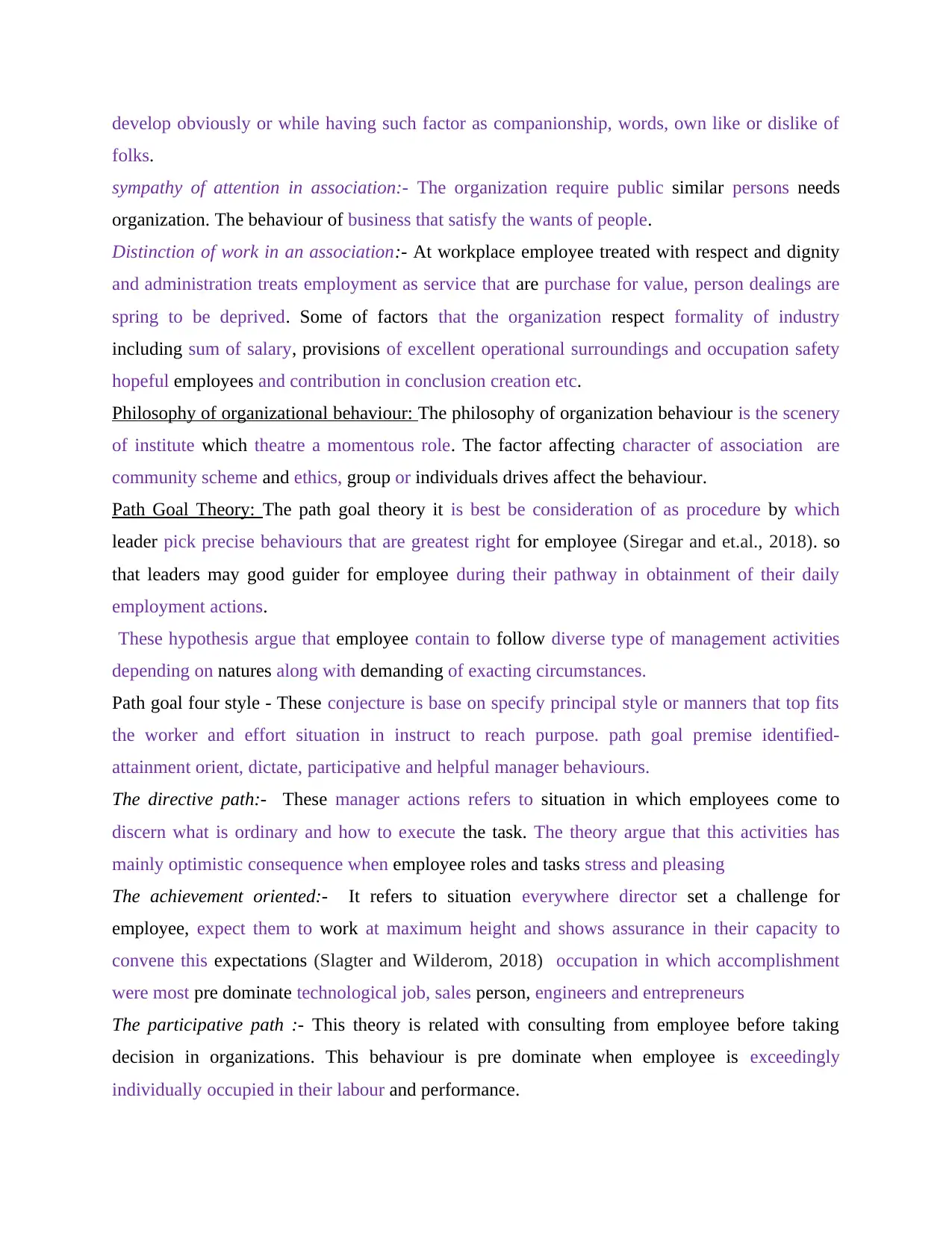
develop obviously or while having such factor as companionship, words, own like or dislike of
folks.
sympathy of attention in association:- The organization require public similar persons needs
organization. The behaviour of business that satisfy the wants of people.
Distinction of work in an association:- At workplace employee treated with respect and dignity
and administration treats employment as service that are purchase for value, person dealings are
spring to be deprived. Some of factors that the organization respect formality of industry
including sum of salary, provisions of excellent operational surroundings and occupation safety
hopeful employees and contribution in conclusion creation etc.
Philosophy of organizational behaviour: The philosophy of organization behaviour is the scenery
of institute which theatre a momentous role. The factor affecting character of association are
community scheme and ethics, group or individuals drives affect the behaviour.
Path Goal Theory: The path goal theory it is best be consideration of as procedure by which
leader pick precise behaviours that are greatest right for employee (Siregar and et.al., 2018). so
that leaders may good guider for employee during their pathway in obtainment of their daily
employment actions.
These hypothesis argue that employee contain to follow diverse type of management activities
depending on natures along with demanding of exacting circumstances.
Path goal four style - These conjecture is base on specify principal style or manners that top fits
the worker and effort situation in instruct to reach purpose. path goal premise identified-
attainment orient, dictate, participative and helpful manager behaviours.
The directive path:- These manager actions refers to situation in which employees come to
discern what is ordinary and how to execute the task. The theory argue that this activities has
mainly optimistic consequence when employee roles and tasks stress and pleasing
The achievement oriented:- It refers to situation everywhere director set a challenge for
employee, expect them to work at maximum height and shows assurance in their capacity to
convene this expectations (Slagter and Wilderom, 2018) occupation in which accomplishment
were most pre dominate technological job, sales person, engineers and entrepreneurs
The participative path :- This theory is related with consulting from employee before taking
decision in organizations. This behaviour is pre dominate when employee is exceedingly
individually occupied in their labour and performance.
folks.
sympathy of attention in association:- The organization require public similar persons needs
organization. The behaviour of business that satisfy the wants of people.
Distinction of work in an association:- At workplace employee treated with respect and dignity
and administration treats employment as service that are purchase for value, person dealings are
spring to be deprived. Some of factors that the organization respect formality of industry
including sum of salary, provisions of excellent operational surroundings and occupation safety
hopeful employees and contribution in conclusion creation etc.
Philosophy of organizational behaviour: The philosophy of organization behaviour is the scenery
of institute which theatre a momentous role. The factor affecting character of association are
community scheme and ethics, group or individuals drives affect the behaviour.
Path Goal Theory: The path goal theory it is best be consideration of as procedure by which
leader pick precise behaviours that are greatest right for employee (Siregar and et.al., 2018). so
that leaders may good guider for employee during their pathway in obtainment of their daily
employment actions.
These hypothesis argue that employee contain to follow diverse type of management activities
depending on natures along with demanding of exacting circumstances.
Path goal four style - These conjecture is base on specify principal style or manners that top fits
the worker and effort situation in instruct to reach purpose. path goal premise identified-
attainment orient, dictate, participative and helpful manager behaviours.
The directive path:- These manager actions refers to situation in which employees come to
discern what is ordinary and how to execute the task. The theory argue that this activities has
mainly optimistic consequence when employee roles and tasks stress and pleasing
The achievement oriented:- It refers to situation everywhere director set a challenge for
employee, expect them to work at maximum height and shows assurance in their capacity to
convene this expectations (Slagter and Wilderom, 2018) occupation in which accomplishment
were most pre dominate technological job, sales person, engineers and entrepreneurs
The participative path :- This theory is related with consulting from employee before taking
decision in organizations. This behaviour is pre dominate when employee is exceedingly
individually occupied in their labour and performance.
Secure Best Marks with AI Grader
Need help grading? Try our AI Grader for instant feedback on your assignments.
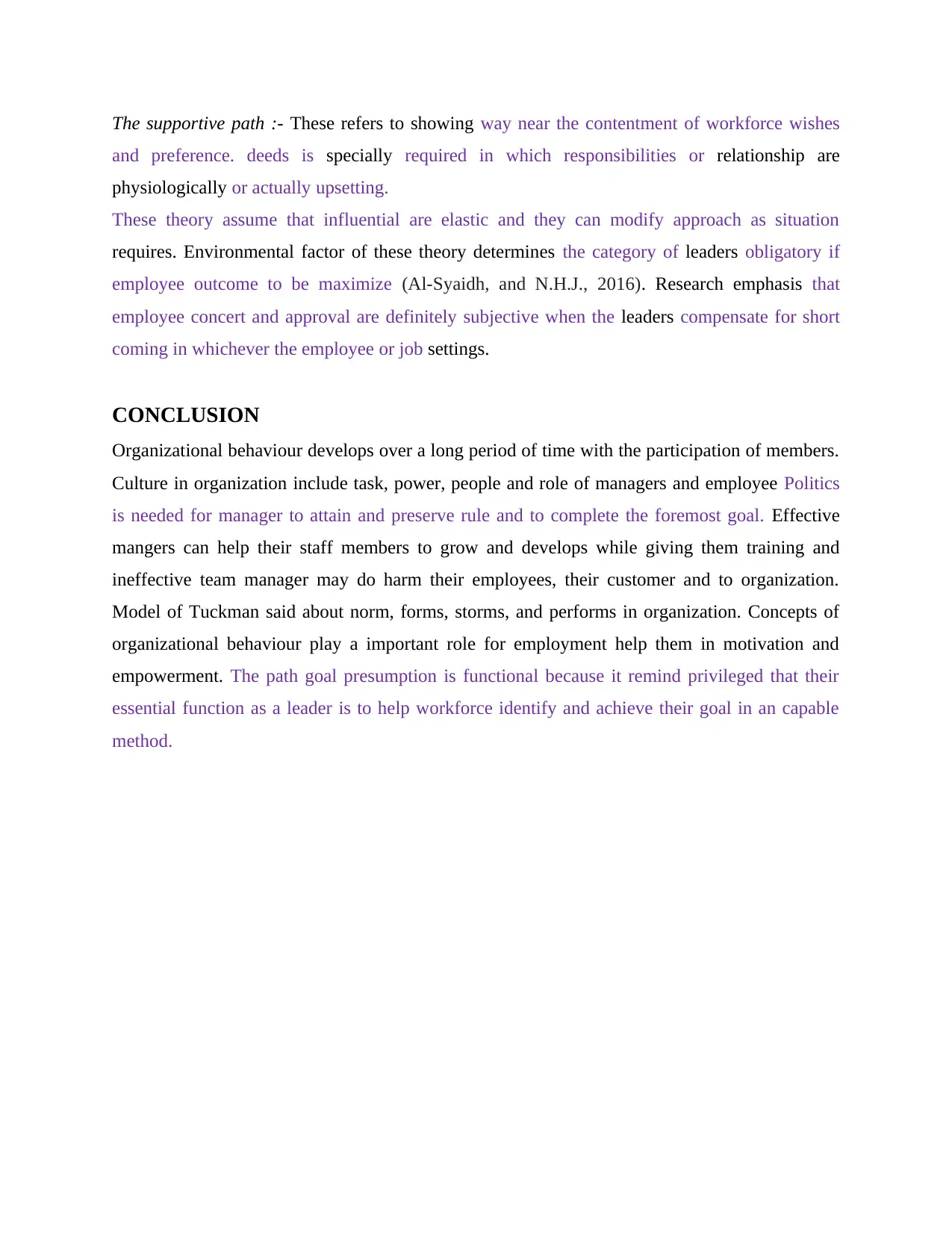
The supportive path :- These refers to showing way near the contentment of workforce wishes
and preference. deeds is specially required in which responsibilities or relationship are
physiologically or actually upsetting.
These theory assume that influential are elastic and they can modify approach as situation
requires. Environmental factor of these theory determines the category of leaders obligatory if
employee outcome to be maximize (Al-Syaidh, and N.H.J., 2016). Research emphasis that
employee concert and approval are definitely subjective when the leaders compensate for short
coming in whichever the employee or job settings.
CONCLUSION
Organizational behaviour develops over a long period of time with the participation of members.
Culture in organization include task, power, people and role of managers and employee Politics
is needed for manager to attain and preserve rule and to complete the foremost goal. Effective
mangers can help their staff members to grow and develops while giving them training and
ineffective team manager may do harm their employees, their customer and to organization.
Model of Tuckman said about norm, forms, storms, and performs in organization. Concepts of
organizational behaviour play a important role for employment help them in motivation and
empowerment. The path goal presumption is functional because it remind privileged that their
essential function as a leader is to help workforce identify and achieve their goal in an capable
method.
and preference. deeds is specially required in which responsibilities or relationship are
physiologically or actually upsetting.
These theory assume that influential are elastic and they can modify approach as situation
requires. Environmental factor of these theory determines the category of leaders obligatory if
employee outcome to be maximize (Al-Syaidh, and N.H.J., 2016). Research emphasis that
employee concert and approval are definitely subjective when the leaders compensate for short
coming in whichever the employee or job settings.
CONCLUSION
Organizational behaviour develops over a long period of time with the participation of members.
Culture in organization include task, power, people and role of managers and employee Politics
is needed for manager to attain and preserve rule and to complete the foremost goal. Effective
mangers can help their staff members to grow and develops while giving them training and
ineffective team manager may do harm their employees, their customer and to organization.
Model of Tuckman said about norm, forms, storms, and performs in organization. Concepts of
organizational behaviour play a important role for employment help them in motivation and
empowerment. The path goal presumption is functional because it remind privileged that their
essential function as a leader is to help workforce identify and achieve their goal in an capable
method.
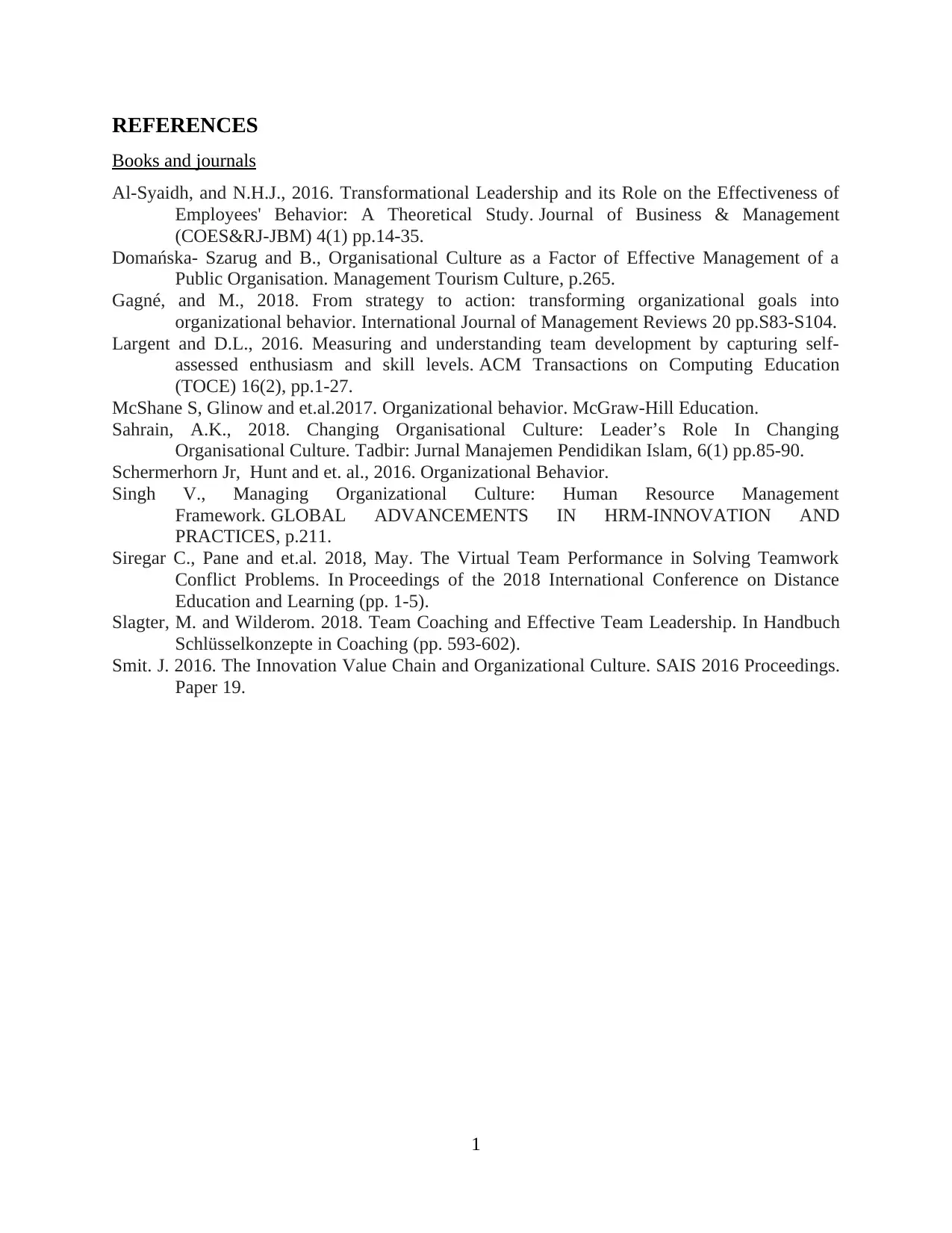
REFERENCES
Books and journals
Al-Syaidh, and N.H.J., 2016. Transformational Leadership and its Role on the Effectiveness of
Employees' Behavior: A Theoretical Study. Journal of Business & Management
(COES&RJ-JBM) 4(1) pp.14-35.
Domańska- Szarug and B., Organisational Culture as a Factor of Effective Management of a
Public Organisation. Management Tourism Culture, p.265.
Gagné, and M., 2018. From strategy to action: transforming organizational goals into
organizational behavior. International Journal of Management Reviews 20 pp.S83-S104.
Largent and D.L., 2016. Measuring and understanding team development by capturing self-
assessed enthusiasm and skill levels. ACM Transactions on Computing Education
(TOCE) 16(2), pp.1-27.
McShane S, Glinow and et.al.2017. Organizational behavior. McGraw-Hill Education.
Sahrain, A.K., 2018. Changing Organisational Culture: Leader’s Role In Changing
Organisational Culture. Tadbir: Jurnal Manajemen Pendidikan Islam, 6(1) pp.85-90.
Schermerhorn Jr, Hunt and et. al., 2016. Organizational Behavior.
Singh V., Managing Organizational Culture: Human Resource Management
Framework. GLOBAL ADVANCEMENTS IN HRM-INNOVATION AND
PRACTICES, p.211.
Siregar C., Pane and et.al. 2018, May. The Virtual Team Performance in Solving Teamwork
Conflict Problems. In Proceedings of the 2018 International Conference on Distance
Education and Learning (pp. 1-5).
Slagter, M. and Wilderom. 2018. Team Coaching and Effective Team Leadership. In Handbuch
Schlüsselkonzepte in Coaching (pp. 593-602).
Smit. J. 2016. The Innovation Value Chain and Organizational Culture. SAIS 2016 Proceedings.
Paper 19.
1
Books and journals
Al-Syaidh, and N.H.J., 2016. Transformational Leadership and its Role on the Effectiveness of
Employees' Behavior: A Theoretical Study. Journal of Business & Management
(COES&RJ-JBM) 4(1) pp.14-35.
Domańska- Szarug and B., Organisational Culture as a Factor of Effective Management of a
Public Organisation. Management Tourism Culture, p.265.
Gagné, and M., 2018. From strategy to action: transforming organizational goals into
organizational behavior. International Journal of Management Reviews 20 pp.S83-S104.
Largent and D.L., 2016. Measuring and understanding team development by capturing self-
assessed enthusiasm and skill levels. ACM Transactions on Computing Education
(TOCE) 16(2), pp.1-27.
McShane S, Glinow and et.al.2017. Organizational behavior. McGraw-Hill Education.
Sahrain, A.K., 2018. Changing Organisational Culture: Leader’s Role In Changing
Organisational Culture. Tadbir: Jurnal Manajemen Pendidikan Islam, 6(1) pp.85-90.
Schermerhorn Jr, Hunt and et. al., 2016. Organizational Behavior.
Singh V., Managing Organizational Culture: Human Resource Management
Framework. GLOBAL ADVANCEMENTS IN HRM-INNOVATION AND
PRACTICES, p.211.
Siregar C., Pane and et.al. 2018, May. The Virtual Team Performance in Solving Teamwork
Conflict Problems. In Proceedings of the 2018 International Conference on Distance
Education and Learning (pp. 1-5).
Slagter, M. and Wilderom. 2018. Team Coaching and Effective Team Leadership. In Handbuch
Schlüsselkonzepte in Coaching (pp. 593-602).
Smit. J. 2016. The Innovation Value Chain and Organizational Culture. SAIS 2016 Proceedings.
Paper 19.
1
1 out of 12
Related Documents
Your All-in-One AI-Powered Toolkit for Academic Success.
+13062052269
info@desklib.com
Available 24*7 on WhatsApp / Email
![[object Object]](/_next/static/media/star-bottom.7253800d.svg)
Unlock your academic potential
© 2024 | Zucol Services PVT LTD | All rights reserved.




